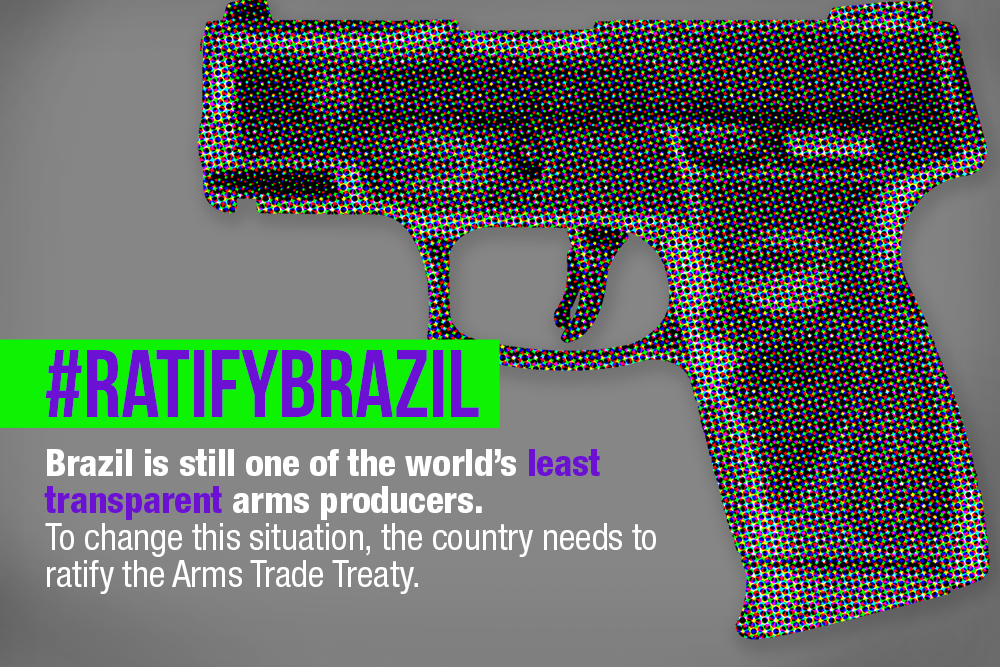On the sidelines of the debate
For the third time, Brazil misses deadline to participate in international conference on the arms trade

Brazil has missed another opportunity to participate actively in the annual international conference attended by States that have already ratified the ATT (Arms Trade Treaty), the first to regulate global transfers of conventional arms and munitions (a category that includes everything from handguns to tanks and combat aircraft).
To have a vote at the event, the country needed to ratify the treaty by this Friday, June 9. Now, representatives of the Brazilian government can only participate as observers.
As the world’s fourth largest exporter of small arms, according to the Small Arms Survey 2015, and one of the first to sign the treaty four years ago this June, Brazil has witnessed large global arms producers such as the United Kingdom, France, Germany and Italy ratify the treaty and take a leading role in the international regulation of the arms trade.
The ratification process has been stalled in the Public Security and Combating Organized Crime Committee of the Lower House of Congress since December 2015. The sponsor of the bill to ratify the treaty, Congressman Lincoln Portela, was appointed in May 2016 but he has yet to present his bill.
Read more
The delays have drawn the attention of the authorities involved in the implementation of the ATT. Klaus Korhonen, the treaty president, has been in Brazil since last Wednesday, June 7, on an official visit and has already participated in meetings in the ministries of Justice, Defense and Foreign Relations. He has also met with Portela and with representatives of civil society organizations. The purpose of his visit was to support the Brazilian ratification and guarantee the universalization of the treaty.
Brazil is the only country in Latin America and the Caribbean to have been visited by Korhonen. Also serving on the delegation is Melanie Régimbal, director of UNLIREC (United Nations Regional Centre for Peace, Disarmament and Development in Latin America and the Caribbean).
The 3rd Conference of States Parties will be held from September 11-15 in Geneva, Switzerland, to define matters of accountability for countries, as well as strategies for the implementation and universalization of the treaty.
“The visit by the treaty president illustrates that Brazil is increasingly more isolated. Until it ratifies the ATT, the country will remain on the sidelines of an extremely important global process and it will be unable to influence the definition of strategic aspects related to the workings of the treaty,” said Jefferson Nascimento, adviser to the Foreign Policy program at Conectas Human Rights.
According to data from the Ministry of Trade and Industry, since the signing of the ATT in June 2013, Brazil has exported more than US$1.46 billion in arms and munitions to 111 different countries.
Control and transparency
In all, 92 countries have already ratified the ATT. By doing so, they agree to not transfer arms or munitions to countries under UN embargo or that could use them to commit crimes against humanity, war crimes or genocide.
Another requirement of the treaty is for transactions to be more transparent: all States Parties must report annually on their imports and exports.
This aspect is particularly relevant for Brazil: despite being one of the world’s leading arms manufacturers, the country is one of the least transparent, according to the Small Arms Survey. In the latest transparency barometer published by the organization in 2014, Brazil came in 43rd place among 53 countries.
Brazil’s current arms and munitions export policy is regulated by a secret decree that dates back to the military dictatorship called PNEMEM (National Export Policy for Military Equipment). The content of this document has never been released.
The lack of transparency in the control of exports has caused Brazil international embarrassment. A UN report published in February 2017 revealed that the Brazilian manufacturer Taurus negotiated and sold a shipment of 8,000 handguns to a known Yemeni arms trafficker just three months before the country was placed under embargo. Yemen has been embroiled in a bloody civil war since 2015.
In 2013, the UN also found Brazilian-made less-lethal weapons in Ivory Coast, which is under a Security Council-imposed embargo.
“These cases show that there is no shortage of reasons for Brazil to ratify the ATT and, furthermore, that each day that Brazil delays can have a direct impact on the lives of thousands of people in other countries. The ratification should not be viewed as a political or bureaucratic quagmire, but rather as an urgent humanitarian matter,” added Nascimento.






